Filter by
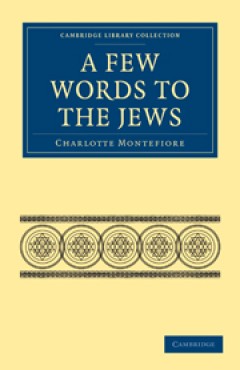
A Few Words to the Jews
Charlotte Montefiore (1818–1854) published A Few Words to the Jews anonymously in 1853. The volume is a collection of essays on Anglo-Jewish life, covering topics including the Sabbath, Jewish women, religious reform and practice, Jewish materialism, immortality, the idea of truth, and religious festivals. The essays, like Montefiore's collection of short stories, The Cheap Jewish Library, an…
- Edition
- -
- ISBN/ISSN
- 9780511751134
- Collation
- -
- Series Title
- Cambridge Library Collection - British and Irish History, 19th Century
- Call Number
- -
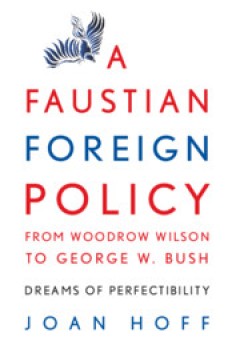
A Faustian Foreign Policy from Woodrow Wilson to George W. Bush
A Faustian Foreign Policy from Woodrow Wilson to George W. Bush critiques U.S. foreign policy during this period by showing how moralistic diplomacy has increasingly assumed Faustian overtones, especially during the Cold War and following September 11. The ideological components of American diplomacy, originating in the late 18th and 19th centuries, evolved through the 20th century as U.S. econ…
- Edition
- -
- ISBN/ISSN
- 9780511511592
- Collation
- -
- Series Title
- -
- Call Number
- -
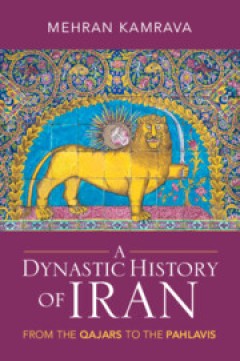
A Dynastic History of Iran From the Qajars to the Pahlavis
This rich dynastic study examines the political histories of Iran's last two monarchical dynasties, the Qajars and the Pahlavis. Tracing the rise and fall of both dynasties, Mehran Kamrava addresses essential questions about how and why they rose to power; what domestic and international forces impacted them; how they ruled; and how they met their end. Exploring over two hundred years of politi…
- Edition
- -
- ISBN/ISSN
- 9781009224628
- Collation
- -
- Series Title
- -
- Call Number
- -
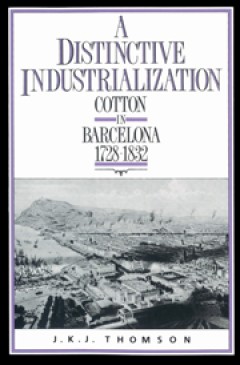
A Distinctive Industrialization Cotton in Barcelona 1728–1832
This book, first published in 1992, is a study of the development of Barcelona's cotton industry from its origins in calico-printing in 1728 to its introduction of steampower in 1832. It thus describes the experiences of the leading industry of the city, and one which provides the only Mediterranean exception to the tendency of early industrialization to be concentrated in northern Europe. The …
- Edition
- -
- ISBN/ISSN
- 9780511523526
- Collation
- -
- Series Title
- -
- Call Number
- -

A Discourse on Property John Locke and his Adversaries
John Locke's theory of property is perhaps the most distinctive and the most influential aspect of his political theory. In this book James Tully uses an hermeneutical and analytical approach to offer a revolutionary revision of early modern theories of property, focusing particularly on that of Locke. Setting his analysis within the intellectual context of the seventeenth century, Professor Tu…
- Edition
- -
- ISBN/ISSN
- 9780511558641
- Collation
- -
- Series Title
- -
- Call Number
- -
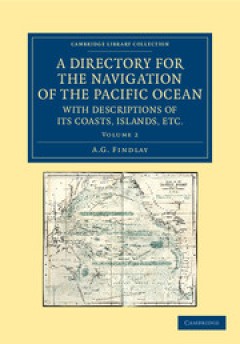
A Directory for the Navigation of the Pacific Ocean, with Descriptions of its…
The English geographer and hydrographer Alexander George Findlay (1812–75) had observed that navigators of his time had to consult a considerable number of documents to gather the information they needed to sail the Pacific Ocean safely. Not only was this highly impractical, it also exposed seafarers to conflicting information that could lead to their demise. First published in 1851, this two…
- Edition
- -
- ISBN/ISSN
- 9781139583114
- Collation
- -
- Series Title
- Cambridge Library Collection - Maritime Exploration
- Call Number
- -

A Diplomat in Japan The Inner History of the Critical Years in the Evolution…
A brilliant linguist, Sir Ernest Satow (1843–1929) was recruited into the British consular service as a student interpreter in 1861. The following year he arrived in Japan, where he witnessed the overthrow of the Tokugawa Shogunate and the Meiji restoration of imperial rule. Drafted in the 1880s while he was consul-general in Bangkok, this 1921 account is based on the voluminous diaries Satow…
- Edition
- -
- ISBN/ISSN
- 9781316144671
- Collation
- -
- Series Title
- Cambridge Library Collection - East and South-East Asian History
- Call Number
- -
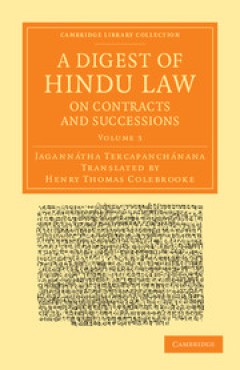
A Digest of Hindu Law, on Contracts and Successions
An honorary professor of Sanskrit and Hindu law at Fort William College in Calcutta, and a key figure in the foundation of the Royal Asiatic Society, Henry Thomas Colebrooke (1765–1837) became Britain's foremost orientalist during the early nineteenth century. Taking up the reins of Sanskrit scholarship following the death of Sir William Jones (1746–94), Colebrooke made several substantial …
- Edition
- -
- ISBN/ISSN
- 9781139519823
- Collation
- -
- Series Title
- Cambridge Library Collection - Perspectives from the Royal Asiatic Society
- Call Number
- -
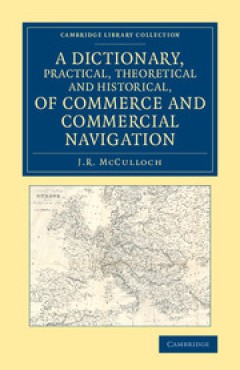
A Dictionary, Practical, Theoretical and Historical, of Commerce and Commerci…
A friend, correspondent and intellectual successor to David Ricardo, John Ramsay McCulloch (1789–1864) forged his reputation in the emerging field of political economy by publishing deeply researched articles in Scottish periodicals and the Encyclopaedia Britannica. From 1828 he spent nearly a decade as professor of political economy at the newly founded University of London, thereafter becom…
- Edition
- -
- ISBN/ISSN
- 9781139941785
- Collation
- -
- Series Title
- Cambridge Library Collection - British and Irish History, 19th Century
- Call Number
- -
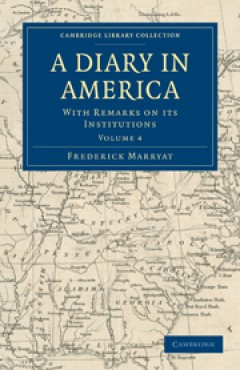
A Diary in America With Remarks on its Institutions
Captain Frederick Marryat (1792–1848) was a distinguished naval officer, today best remembered as a novelist (particularly of stories for children), often drawing on his own experiences. He also edited a radical journal, and wrote non-fiction, including an attack on press-gangs, which damaged his career. He spent 1837 and 1838 travelling in North America, publishing his impressions in this un…
- Edition
- -
- ISBN/ISSN
- 9781139058704
- Collation
- -
- Series Title
- Cambridge Library Collection - North American History
- Call Number
- -
 Computer Science, Information & General Works
Computer Science, Information & General Works  Philosophy & Psychology
Philosophy & Psychology  Religion
Religion  Social Sciences
Social Sciences  Language
Language  Pure Science
Pure Science  Applied Sciences
Applied Sciences  Art & Recreation
Art & Recreation  Literature
Literature  History & Geography
History & Geography